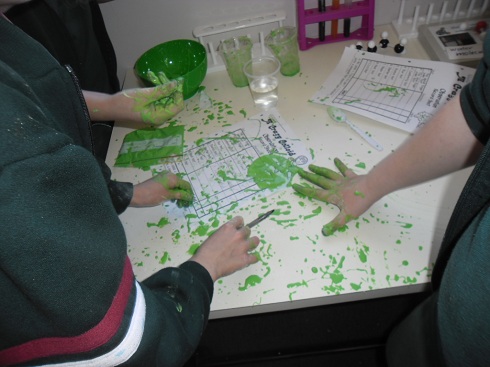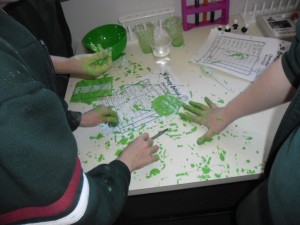We’re Just Playing. Science by Stealth

One of my students asked me the other day why I like science so much. “Easy”, I replied. “You get to play with stuff’. Who can argue with Einstein and his claim that, “Play is the highest form of research”?
After all, science is about conducting research to make meaning of the world and the myriad of amazing scientific phenomena it offers. Children are naturally curious about their world. “Why” seems to be the first question asked. Sure they can read about it in a book, be lectured by someone much older and wiser, or they can work it out themselves, get their hands dirty and amuse their minds with rich experiential science play. This is what is on offer at SC@M (Science Club at Mitchelton).
In our weekly sessions at SC@M, we facilitate student learning through sharing the experience, at times guiding their questions and guiding their exposure. The experiences offered to them are scaffolded, with the aim that children will make their own scientific links and conceptual understandings will grow and develop. For our unit on chemistry we experimented with mentos and diet coke against other soda drinks, and then compared that reaction to elephant’s toothpaste. In our unit on biology we extracted strawberry DNA, and then tried to extract some of our own DNA from buccal scrapings. In the play environment of SC@M, children can take risks with their learning, without the need of structured assessments.
The assessment of the learning in SC@M is in the rich scientific conversations we share. Questions change from why to how and what if. Children playing with the colloid cornflour goop are forced to examine the properties of matter. How does this colloid behave like a solid and can be moulded into a shape, yet lose any structure when the force is removed? It pours beautifully yet can be cut with a knife? With these questions, I can take them to the world of non-Newtonian fluids, to polymers to make slime. Through play, the children are eager to understand more. This is evident every week with the loud groans that fill the room when the bell goes and it is time to leave.

Play is transformative and what is learnt through play in SC@M will undoubtedly help children learn in their classroom. Learning requires children to encode memories and make links between them; these memories are stored deep within the limbic system. Whilst the limbic system is complex in its physiology and the nature of memory recall and storage multifaceted, memories associated with positive emotional stimuli are strongly encoded. Play is particularly an example of positive emotional stimuli.
Play-based learning is highly sanctioned in early year’s curriculum, but why do we need to stop? Ask any child who doesn’t like science and it’s about too much writing, too much theory, too much bookwork. Maybe, we just should let them play some more. Now scientists do need to document and communicate their understandings and this is a vital to the very nature of science. The problem is that research suggests that children switch off science as they age. We need a balance between the experiential and the theory. We want children to be so amazed at their discoveries that they are eager to share and document what they have learnt.
Despite any anecdotal evidence of the benefits of play that we see week after week at SC@M, researchers claim that there are both emotional and cognitive benefits of play. Notably, Marion Diamond’s 1964 research that showed growth in the cerebral cortex of some very lucky rats placed in an enriched environment. Cerebral growth and neural wiring was dependent upon stimuli offered, and so it is for children as well.
Neuroplasticity would arguably be at its greatest in the pre-adolescent brain before natural pruning occurs. Pre-adolescent children have brains that are capable of being directed as neural wiring is not yet complete. Rich experiential science play surely has the potential to affect neural development towards a scientific reasoning brain; a curious brain, a brain that wants to play with even more science.
 Follow
Follow
2 thoughts on “We’re Just Playing. Science by Stealth”
Comments are closed.